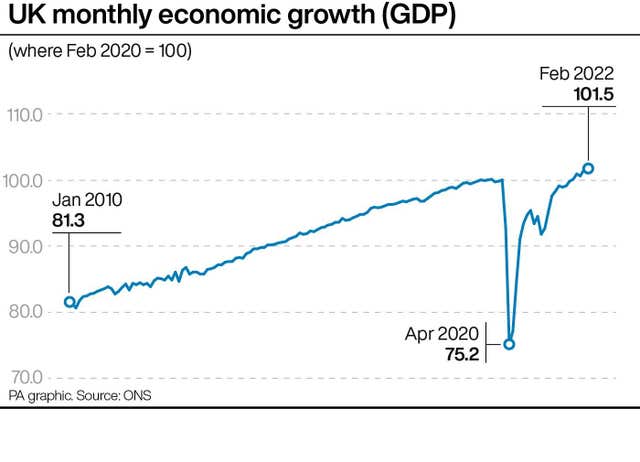
Clive Bull 1am - 4am
11 April 2022, 10:24

The Office for National Statistics said GDP grew just 0.1% in February compared to growth of 0.8% in January.
The speed at which the UK economy grew slowed significantly in February as the cost-of-living crisis started to take hold, according to new data.
The Office for National Statistics (ONS) said gross domestic product (GDP) increased just 0.1% in February, compared to a rise of 0.8% in January.
This was below an expected rise of 0.3% predicted by economists.

Growth was seen in the hospitality and leisure sectors as Omicron infection numbers eased compared to December and January.
But GDP was hit as Government spending on the NHS test and trace system and Covid-19 vaccination booster programme slowed in February.
There were also slowdowns in construction industries as business confidence took a knock, with the cost-of-living crisis and high energy bills leaving bosses uneasy about making significant investments.
Suren Thiru, head of economics at the British Chambers of Commerce (BCC), said: “While economic output continued to rebound in February, the significant slowdown in growth indicates that the UK economy was losing steam even before the impact of Russia’s invasion of Ukraine.
“Tourism-related industries and accommodation services recorded the strongest improvements in the month as the end of Plan B restrictions, and reduced concerns over Omicron, supported activity.
“However, this was mostly offset by a significant drop in NHS Test and Trace services and vaccine activity as well as declines in industrial and construction output.”
“February’s slowdown is likely to be the start of a prolonged period of considerably weaker growth as rising inflation, surging energy bills and higher taxes increasingly damages key drivers of UK output, including consumer spending and business investment.”
The key driver of growth for the economy during the month of February came from the services sector – up 0.2% – with the ONS saying there were increases in travel agency, tour operator and other reservation services – up 33.1% on the month.
Accommodation and food services were up 8.6% in February, with healthy growth in hotel bookings as the Omicron variant faded and people tried to get away.
The biggest negative contributor in consumer-facing services was the motor industry with sales of cars and repairs down.
This also impacted car factories, which saw slowdowns, along with falls in the manufacturing of computers and other electronics – where chip shortages continue to bite.
GDP grew 0.1% in February ad is now 1.5% above its pre-pandemic level.
Services grew 0.2% (2.1% above), manufacturing fell 0.4% (0.7% below) and construction fell 0.1% (1.1% above) https://t.co/tXQpG2fBnX pic.twitter.com/FnduF93fUC
— Office for National Statistics (ONS) (@ONS) April 11, 2022
Overall, the services are now 2.1% above pre-Covid levels with construction up 1.1%. But production is now 1.9% below pre-pandemic levels.
Alpesh Paleja, Confederation of British Industry (CBI) lead economist, said: “Following the bounce at the start of the year, it’s no surprise that economic growth slowed in February.
“Near-term challenges to the outlook have ramped up since, with a growing cost-of-living crunch set to weigh on growth.
“Businesses are also grappling with headwinds from the Ukraine conflict, which is exacerbating cost pressures and supply chain disruption.”
Chancellor Rishi Sunak said: “I welcome the positive growth seen across the economy in February, which continues to recover from the pandemic, boosted by the support we provided.
“Russia’s invasion of Ukraine is creating additional economic uncertainty here in the UK, but it is right that we are responding robustly against Putin’s unprovoked invasion.”
Separately, the ONS released a new set of figures caused by a change in how HM Revenue and Customs measures exports to the EU.
While the new measure shows a 25.4% rise in goods exports to the EU in February compared to the month before, this was a decrease by 0.3% compared to December 2021 under the old system.
The ONS suggested the new month-on-month movements should not be relied on when interpreting the latest data for exports to the EU.
Exports to non-EU countries dropped 6.4% between January and February, the figures show.
The UK’s trade deficit widened by £10.2 billion to £54.4 billion in the three months to February.